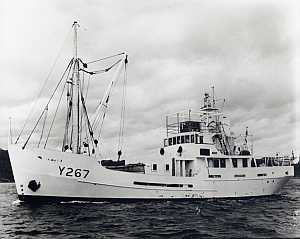- Author
- Howland, Tony
- Subjects
- Biographies and personal histories, Ship histories and stories, Post WWII
- Tags
-
- RAN Ships
- HMAS Bass
- Publication
- June 2006 edition of the Naval Historical Review (all rights reserved)
It was early 1964. I recall it was a Sunday. Darwin dozed through a typical Wet Season day – humidity ‘off the clock high’, stinking hot, ‘suicide weather’ the locals called it. The conflict known as the Indonesian Confrontation sputtered, and occasionally flared, not far away to the north. But here in Darwin, if there were any thoughts of an impending invasion by a ravening force from the land just over the horizon, there was no sign of it. There was no apparent fear, peace prevailed through a torpid afternoon.

(Photo: NHSA Collection)
As well it might, for there, in the lee of Stokes Hill Wharf, lay HMAS Bass, white hull reflecting the swirling waters of a rising tide, buff coloured funnel sending out the occasional belch of black smoke as, inevitably, even on his day off, the Chief Tiffy and his crew tinkered with the main engine. ‘Sleep tight tonight, Darwin,’ we had always said. ‘Your Navy is awake and ready to go!’ Said in cynical jest of course, but we were about to prove our point. A flurry of phone calls from Naval Headquarters set in motion a clandestine operation relying for its success on a level of unrehearsed interservice co-operation unprecedented in Darwin since World War II.
It seemed that a fairly vague message from the settlement at Milikapiti on Melville Island away to the north-west, reported that ‘a submarine had surfaced off a small island to the north of Snake Bay, and had sent a landing party ashore.’
Bass was directed to sail, darkened, at sunset, and rendezvous with an army workboat off Emery Point, there to embark a small squad of armed soldiers and their small wooden landing craft. We were to make overnight passage to be off Snake Bay at dawn the next day, and to deal smartly with ‘the intruders’. The Indons, for who else could it be, would soon feel the strength of Australia’s northernmost garrison.
We considered what we might do to assist our landing force. Bass travelled under the livery of the Hydrographic Branch, otherwise known as the “Buff Funnel Line”, and projected the same pacific image as others of the line. We carried one pistol, and a .303 rifle, both clean and functioning, but very old – not exactly reassuring in terms of laying down covering fire for the troops as they hit the beach.
It should be noted here that neither the Captain or I were Hydrographers by trade. We both came from the ‘Grey Funnel Line’, and our initial reactions to the intelligence were nurtured in that more aggressive environment. We questioned the quality of the intelligence – there didn’t seem to be enough water off Snake Bay to allow a submarine of any sort to approach, even on the surface. What sort of submarine was it? Had the residents of Milikapiti ever seen a submarine before? How far away had it been from those who had made the sighting? We wondered too if the submarine would be hanging round to provide some kind of cover for the troops on the island. What might they do to us if they detected our approach? More to the point, what could we do to protect ourselves, or to retaliate perhaps? We shook our heads in disbelief, but our orders were quite clear. It didn’t bear thinking about – ‘Australia expects . . .’ and all that. We threw ourselves into our preparations.
Our first glimpse of ‘the landing force’ was not entirely reassuring. First over the side was a Major of the Infantry, who proudly wore campaign medals from the Korean War. We knew him well as a very active messmate in the Army/Navy mess at Larrakeyah where he would usually lead the singing late on Friday evenings. He made a frequent joke that the ‘the garrison’ here in Darwin was staffed mainly by ‘butchers and grocers’ and boasted few of the real soldiers he had led on his last outing in Korea. Indeed, the troops who followed him over the side were noticeably fleshy, their webbing ill-fitting and obviously hastily donned. Still, they were armed, some with semi-automatic weapons, some with rifles, and all with grenades. Even so, the Captain and I hoped, quietly, that the landing beach would not be too steep, nor the landing itself too vigorously opposed. The overnight passage was, thankfully, quiet and the seas calm. Seasickness would be the last burden these men needed.




